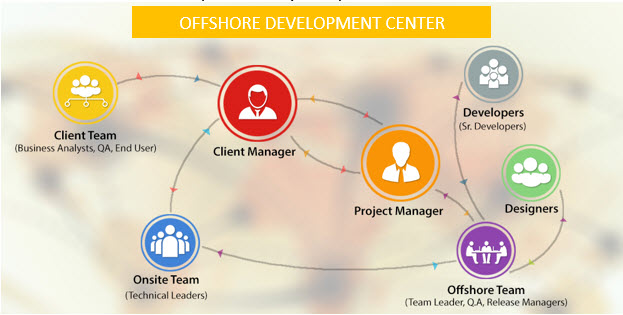

January 5, 2018 - by Manan Thakkar
Given the pace at which the industry is growing, offshoring software development for technological and cost reasons is a natural business move. By offshoring a range of software development tasks – from simple coding to custom development, software support and maintenance, mobile application development, and website design and development – you are not only freeing yourself from the challenge of hiring and empowering skilled staff, but also ensuring you get the best quality software delivered to you in the shortest possible time. This ultimately reduces development time and improves your time-to-market.

The decision to develop software in-house or to hire an offshore development partner is not easy. But, considering the benefits it offers, offshoring software development is an attractive business proposition:
1. Lower cost:
It’s challenging and costly to maintain an in-house IT team that has expertise in the latest technologies. By offshoring your software development, you don’t have to invest in IT infrastructure or spend time recruiting, hiring, and training employees.
2. Access to a vast pool of talent:
With offshore development, you can get access to a vast pool of talented and knowledgeable software engineers with extensive experience developing software applications of international standards and quality. In addition, since the offshore partner has experience working on international custom software development projects for other clients, they understand the challenges involved.
3. Faster time-to-market:
With a dedicated team for each project, you can be sure to have qualified people working around-the clock-to deliver quality software. Not only can you get work done faster, but you can also ensure your product reaches the market sooner. Plus, an external team can offer new insights to improve your business processes, letting you leverage innovation and creativity at each stage of the software lifecycle
4. More time to focus on core business activities:
Offshore software development enables you to focus more on your core business strategy, instead of worrying about managing the complex and time-consuming process of software development. It lets your company focus on core practices without the additional stress of running and managing a software development department.

5. Business growth:
Offshore software development gives companies of all sizes access to the same skilled labor force, reducing costs and the time required to develop software. Freeing up time allows you to leverage your strengths and core operations, and work towards sustained business growth.
If you’re looking to offshore some of your software development, then here are some best practices to help you reach your goals:
1. Get introduced to all offshore developers:
When offshoring a major chunk of your software development, its best for your team to get introduced to the entire team, and not just the offshore team lead. A strong partnership with offshore developers is key to a successful outcome.
2. Build small, but highly skilled teams:
Instead of having a large team of developers, insist on smaller, more skilled teams. The smaller the team size, the better the visibility and the healthier the communication, leading to a more beneficial outcome.
3. Have a full-time onshore and offshore team lead:
A full-time onshore team lead and a corresponding offshore technical lead is essential for timely communication of business priorities. The team leads can establish necessary coding standards and practices, help solve technical challenges, review code, and help train and mentor the offshore team.
4. Arrange for daily meetings using videoconferencing:
Frequent communication and collaboration between the onshore and offshore team leads is imperative for meeting project goals. Arrange for daily status meetings, preferably through videoconferencing, so that every issue is addressed in a timely and efficient manner.
5. Use appropriate software development tracking tools:
While offshoring software development, it is essential to plan, track, and release quality software to meet the needs of your business. Software development tracking tools like Jira enable you to efficiently plan tasks, distribute them evenly across teams, and prioritize work accordingly.
Developing software has never been easy – being a complex process which includes a series of tasks, it requires companies to embrace the latest trends in order to remain competitive. Several new trends constantly emerge in offshore software development, the latest being:
1. Cloud computing:
Cloud computing will be a vital part of all offshore software development, and will play a crucial role in offering scalability and flexibility. With companies realizing the possibilities and benefits of cloud computing, it is set to become a way of life in offshore software development, addressing the growing needs of companies worldwide.
2. Automation:
Automation will be instrumental in reducing the dependence on human effort, driving down the costs and risks associated with manual labor. Companies looking for hassle-free software development services will gain a lot from automation – they can innovate and respond faster to changing business needs to gain a competitive edge and substantially reduce administrative overhead.
3. AI:
AI is picking up steam in offshore software development. The most popular use is improving the quality of code, as well as testing. Offshore software developers will be able to build better software faster using AI technologies, such as advanced machine learning, natural language processing, and business rules.
Clearly, it makes good financial and business sense to seek outside expertise in software development. And although it might seem difficult, offshore software development is not as scary, provided you plan properly, and understand the risks involved. Carefully define your project, choose the best offshore development partner, and make use of best practices to keep work transparent, communication easy, and the project coordinated.
Learn more about how an experienced technology partner can help businesses make decisions about offshore software development.
